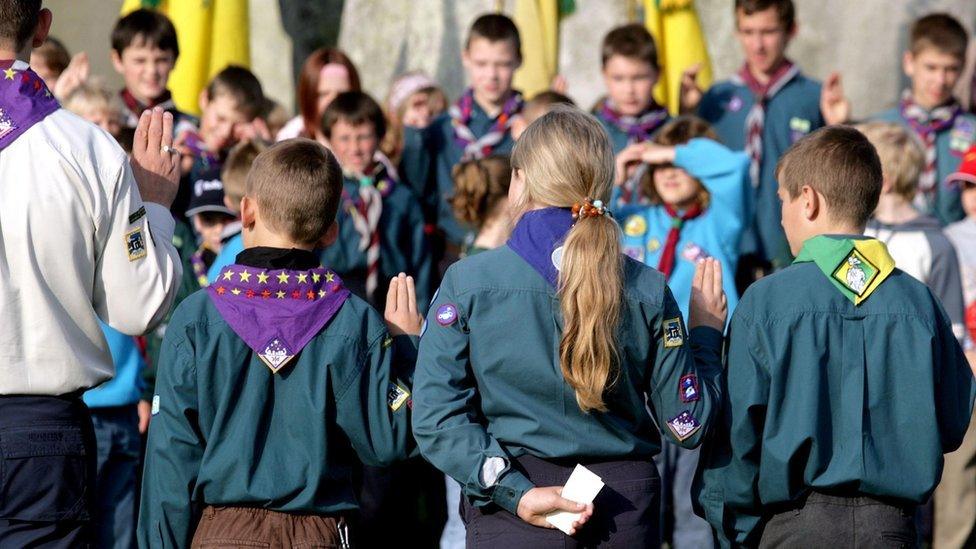Why the Scouts are launching a money badge after Covid
- Published
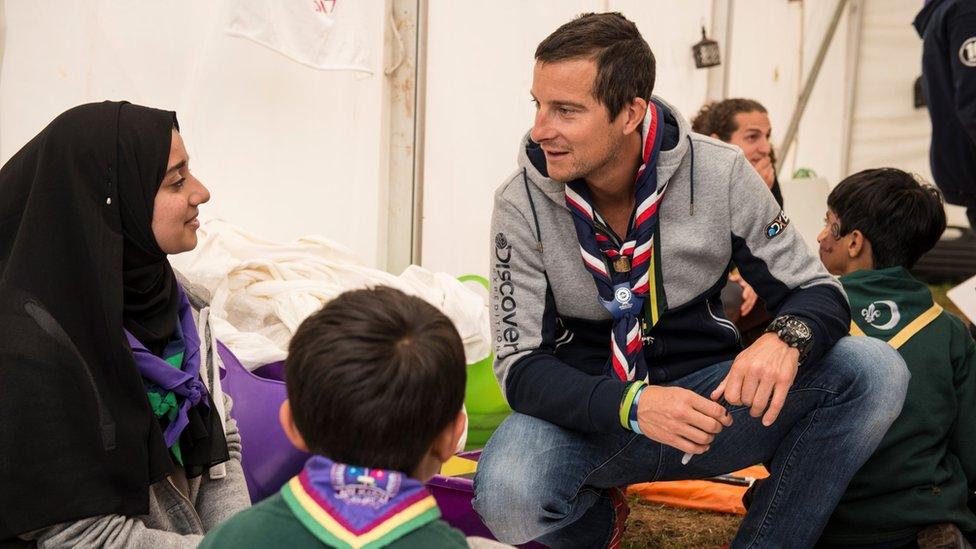
UK chief Scout Bear Grylls talking to volunteers and a pack
Children start forming their spending and saving habits as early as seven, but unlike in other countries money management skills are not part of the core curriculum in England's primary schools.
So, the ever-practical Scout Association is stepping in to lend a hand.
The vast youth organisation, which includes more than 57 million scouts around the world, is launching a new merit badge in the UK all about money.
Qualifying for the money skills award will involve children picking from up to 20 different activities to complete their badge.
These activities include group tasks for money-savvy Beaver Scouts and Cub Scouts to try out - such as creating their own currency or budgeting for a camping trip.
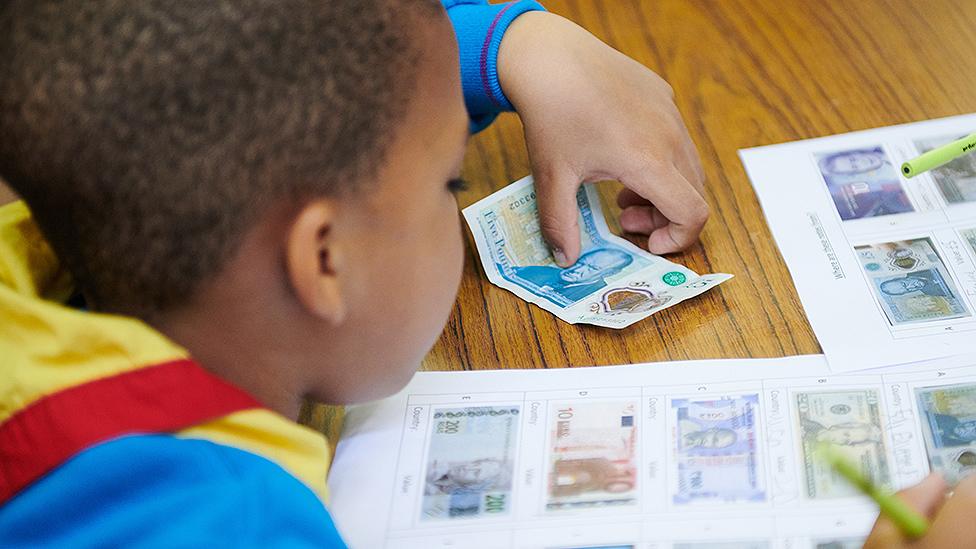
Beaver Scouts came up with their own currencies
It is hoped that the badge will help around 200,000 children aged six to 10 get to grips with financial literacy skills.
The components of the new badge were developed with some funding from HSBC Bank and in consultation with 400 young people, parents and Scout leaders who came up with ideas for activities. These were then aligned with age-appropriate skills suggested by the Young Money charity.
Badges are a crucial pillar of scouting, helping children acquire a huge range of skills from fire-lighting to DIY. But things have moved on, and over the years recent additions to the range of badges that kids work towards are environmental conservation and digital citizenship.
Part of the rationale for launching the money skills badge, external now is as a response to the disruption to maths and numeracy learning for millions of children caused by Covid.
A 2020 survey by consultants, Censuswide, of 1,001 parents with children aged between five and 20, found that more than half of UK children aged six to 10 said they didn't understand money.
There are concerns that large numbers of children have gaps in their understanding that may have been exacerbated by the pandemic.
Multiple research has shown that even once people have left school, many young adults still lack basic financial skills and knowledge.
The National Literacy Trust commissioned a report in 2019 analysing literacy and financial capabilities and found nearly a quarter of UK adults struggle with basic numeracy. The knock-on effect is that millions of people have problems budgeting effectively, planning for the future and making informed decisions about their finances.
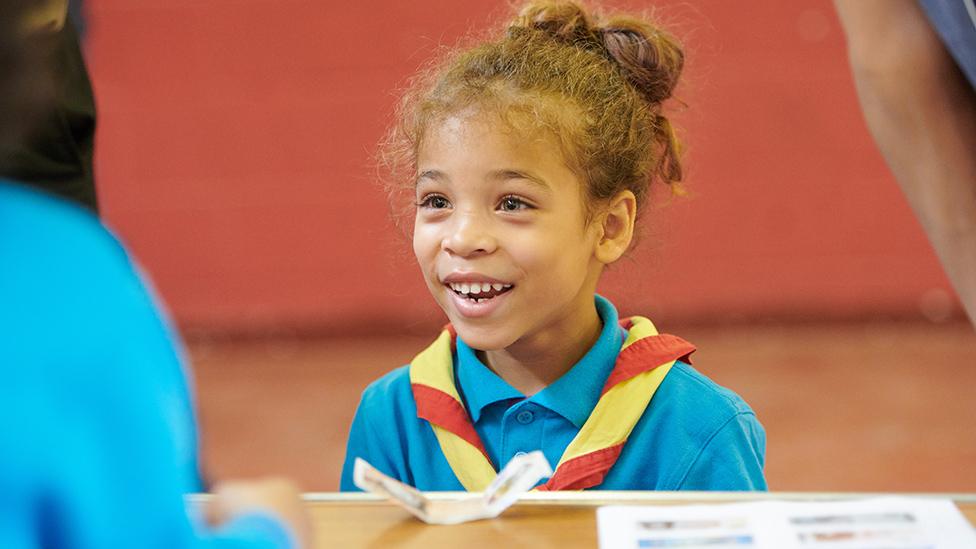
Tasks to earn the badge are split according to age group
It's a worrying picture that's reflected internationally. Organisation for Economic Co-operation and Development (OECD) figures reveal that in 2017, one in four 15-year-olds from 15 countries were unable to make everyday spending decisions.
'Be prepared' is a key scouting motto and after a pandemic that has seen job losses and household budgets tighten across the country, this is exactly what young people need right now, says Amy Butterworth, programme design manager at The Scout Association.
"Young people are going to be hit in a way that we can't yet predict," says Ms Butterworth. "So, we want to make sure that they can practise [using money] in a safe environment and build on decision-making skills they already have, to get them confident in financial situations for the future."
It's a feeling echoed by Bear Grylls, UK Chief Scout, who hopes the new badge will help Cub Scouts and Beaver Scouts develop life-long financial skills "in a way that only Scouts can by helping them build their confidence and understanding of money in hands-on format".
"One of the activities is to learn about the difference between needs and wants," says Ms Butterworth.
"For example, what do you want to bring on your hike? They get to make choices between objects like a bottle of water or a laptop and we give them a chance to practise making those decisions and understanding the impact of them," she says.
Ms Butterworth says this then leads to a discussion with the children about the difference between needs and wants when they spend their money.
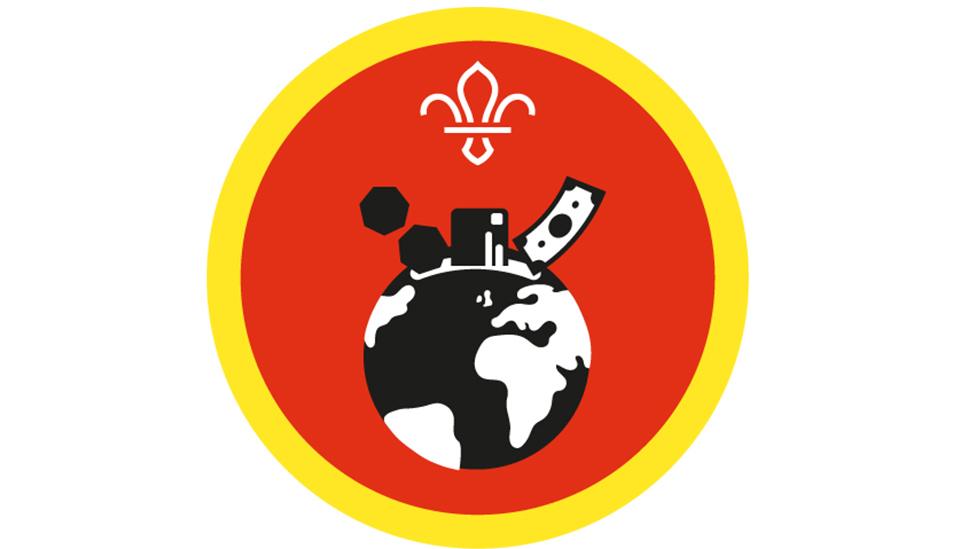
The design for the badge has a globe in the middle, with 50 pence coins going into it to symbolise saving and a debit card
Summya is the Cub Scout leader for 10th Fulwood pack in Preston, Lancashire, one of 20 groups involved in helping to test the new badge.
She thinks bringing in the badge is especially important now, when parents are using contactless payment more frequently and fewer notes and coins.
"A lot of kids think that money just comes magically from a card and there's an endless supply of it, and mum and dad just generally buy whatever they need, whenever they want without giving a thought to the cost," she says.
For the six-to-eight-year-old Beaver Scouts, one of the activities designed to teach them about tax is through a game about community. The children are bees collecting nectar for their hive, they have to work together to share and look out for each other.
"I haven't really learnt much about money at school," says Saara Ali, 9, from Preston, who is part of 10th Fulwood Cub Scouts.
"I think it's really important to learn about different currencies because at my age we go on holiday and they use different types of currency like euros and dollars so it's important to learn about them, not just pounds and pence," she adds.
Ameerah Patel, 9, was also part of the test group. "I've learned how to manage money, how to save money, share money and spend it and make sure we do it wisely and not to waste it," she says.
- Published16 June 2021
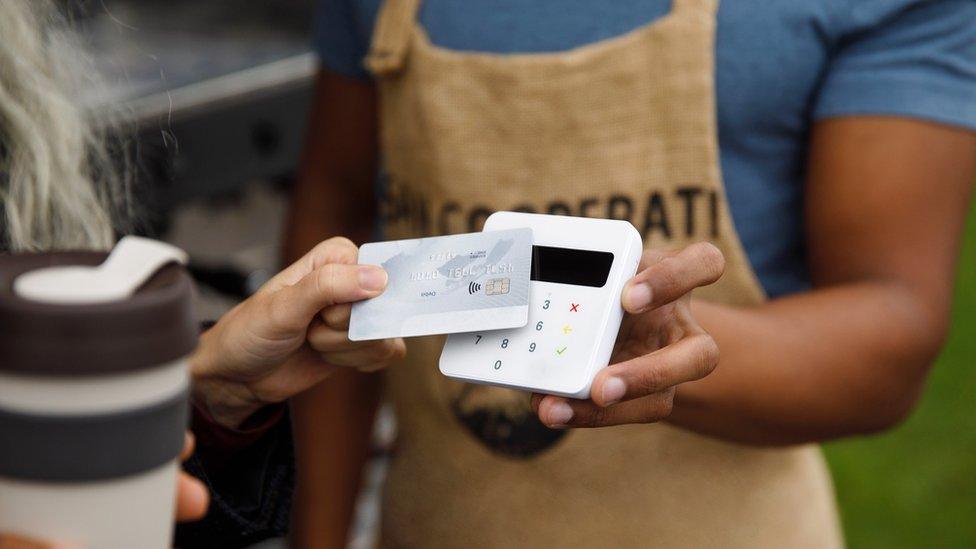
- Published4 January 2021
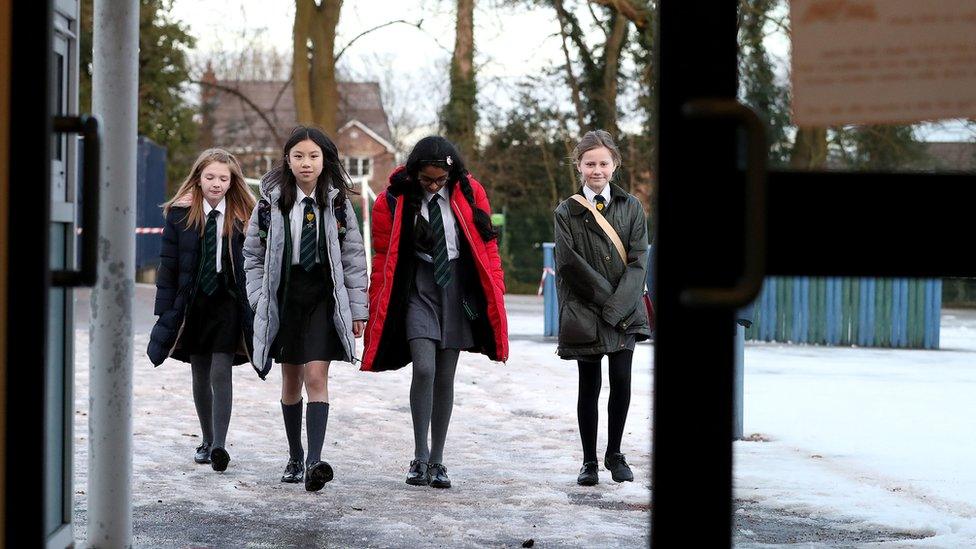
- Published30 October 2020
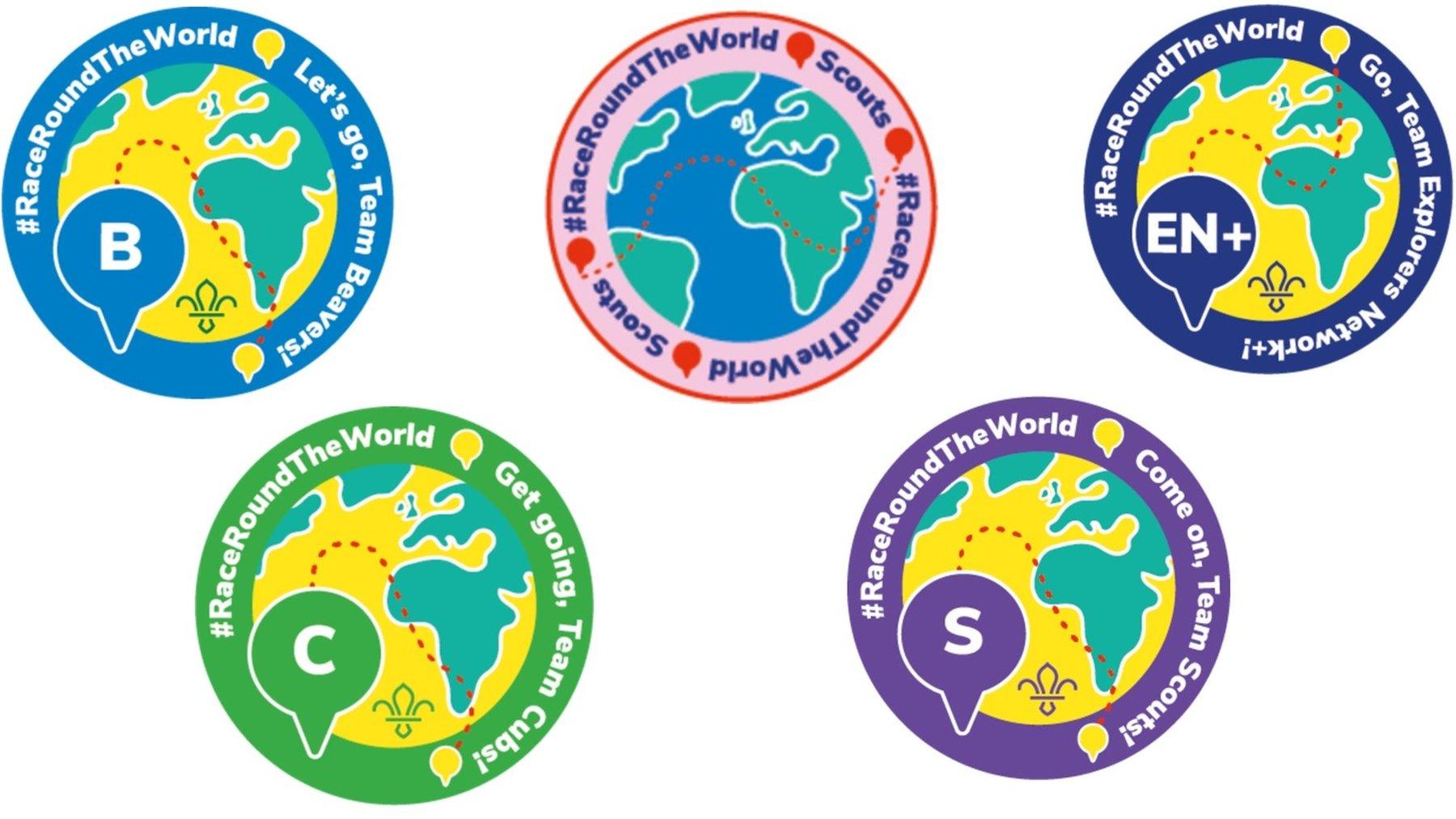
- Published29 October 2020
